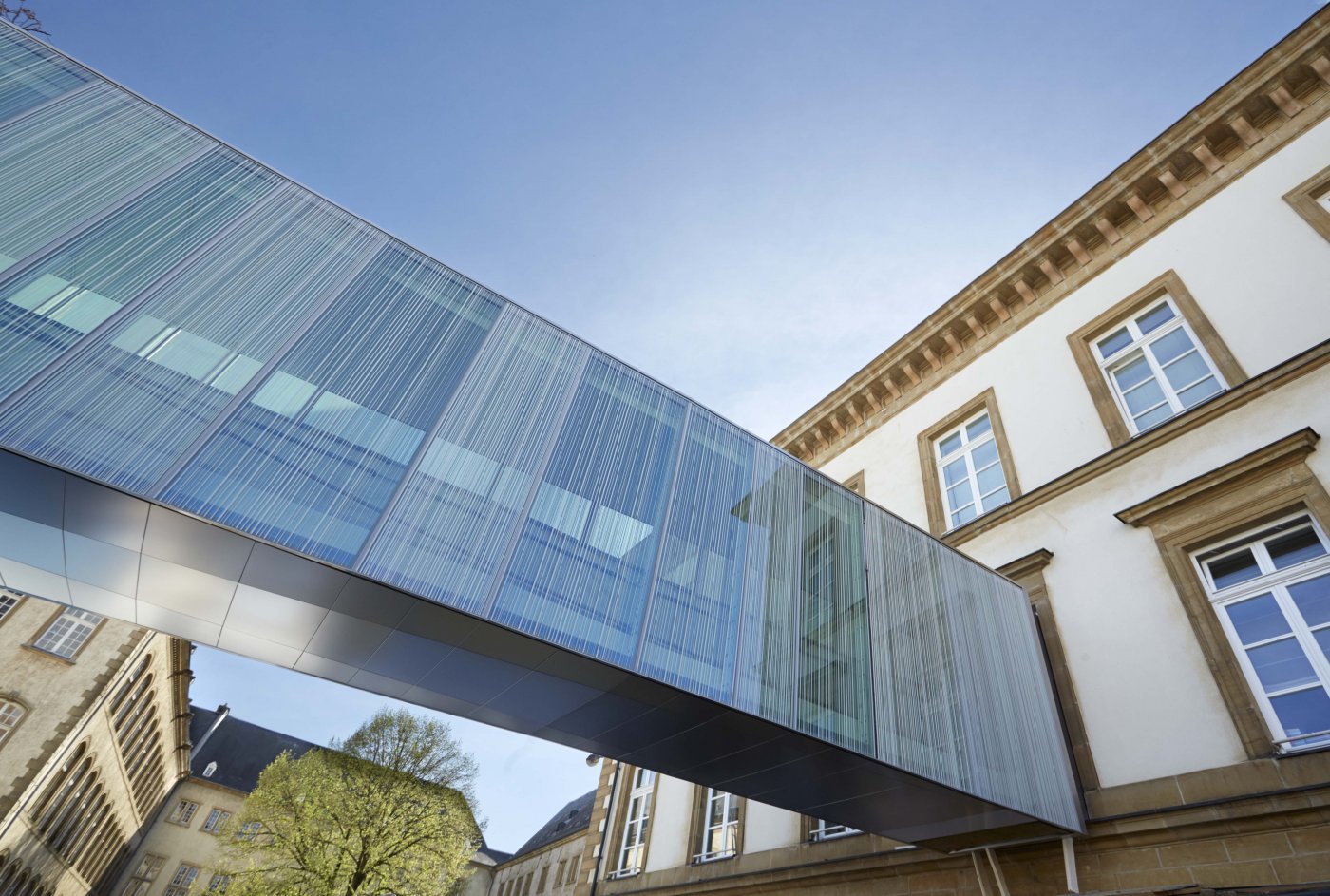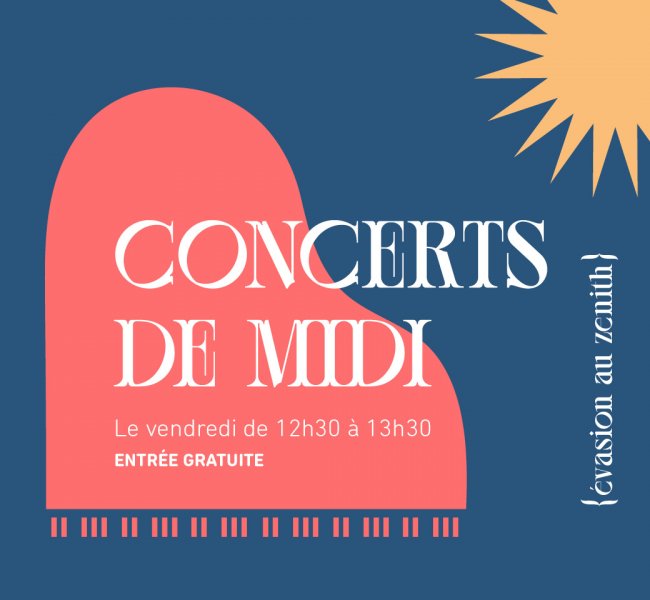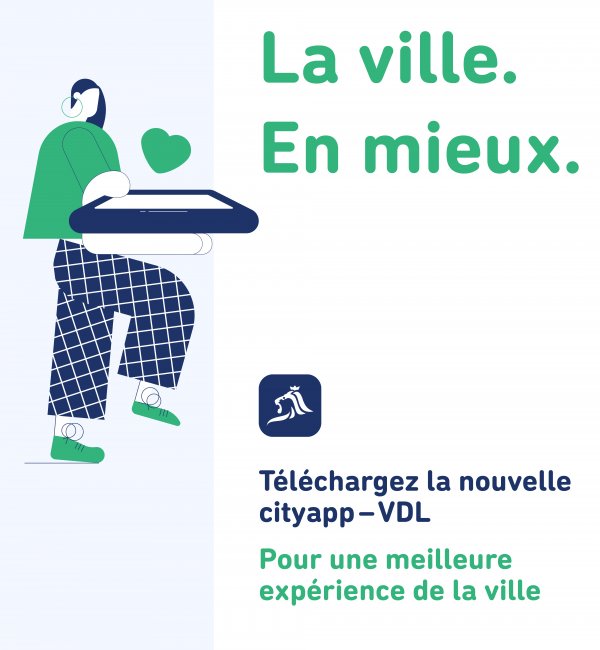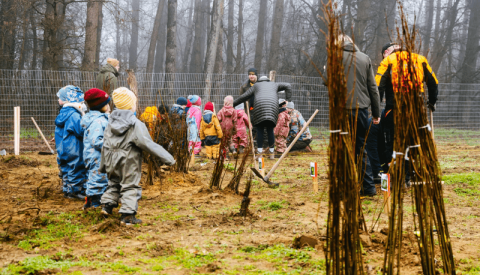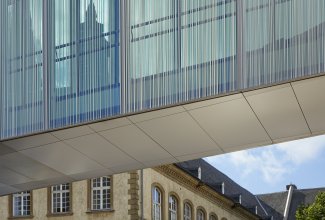Closed session
- Municipal advisory committees – replacement of one member.
- Personnel matters – decision.
Open session
3. Questions asked by municipal councillors.
4. Education: school organisation for the 2025/2026 school year:
- College of Aldermen's responses to councillors' questions/statements.
- vote.
5. Traffic: permanent changes to the traffic regulations – temporary regulations – confirmation of temporary regulations – decision.
6. Agreements – approval.
7. Work estimate – approval. – Amended estimate for the project to overhaul the "Birelergronn" group's B9, B10 and B10a spring water catchments.
8. Urban planning:
- Limited amendment to the "Rue de Marville" PAG – referral.
- Limited amendment to the "Parc des Aubépines" PAP – vote.
- Limited amendment to the "Grossfeld ZM Sud – îlots D et E" PAP – vote.
- Limited amendment to the "Cité de la Sécurité Sociale" PAP – vote. - Subdivision of land pursuant to Article 29 of the law on municipal planning (loi concernant l'aménagement communal) – decision.
9. Awarding of grants – decision.
10. Increase in the share capital of Luxexpo S.A. – decision.
11. Legal affairs: authorisations to initiate legal proceedings – decision.
12. Creation/elimination of staff positions – decision.
Live broadcast of meetings
Watch the video recording of this session.
Summary record
The summary record is a transcript of the discussions held and decisions taken by the municipal council. As such, it is an important source of information for citizens of the capital with regard to projects and measures that may have an impact on their daily life.
The summary record of this session will be made available shortly.
Keep reading
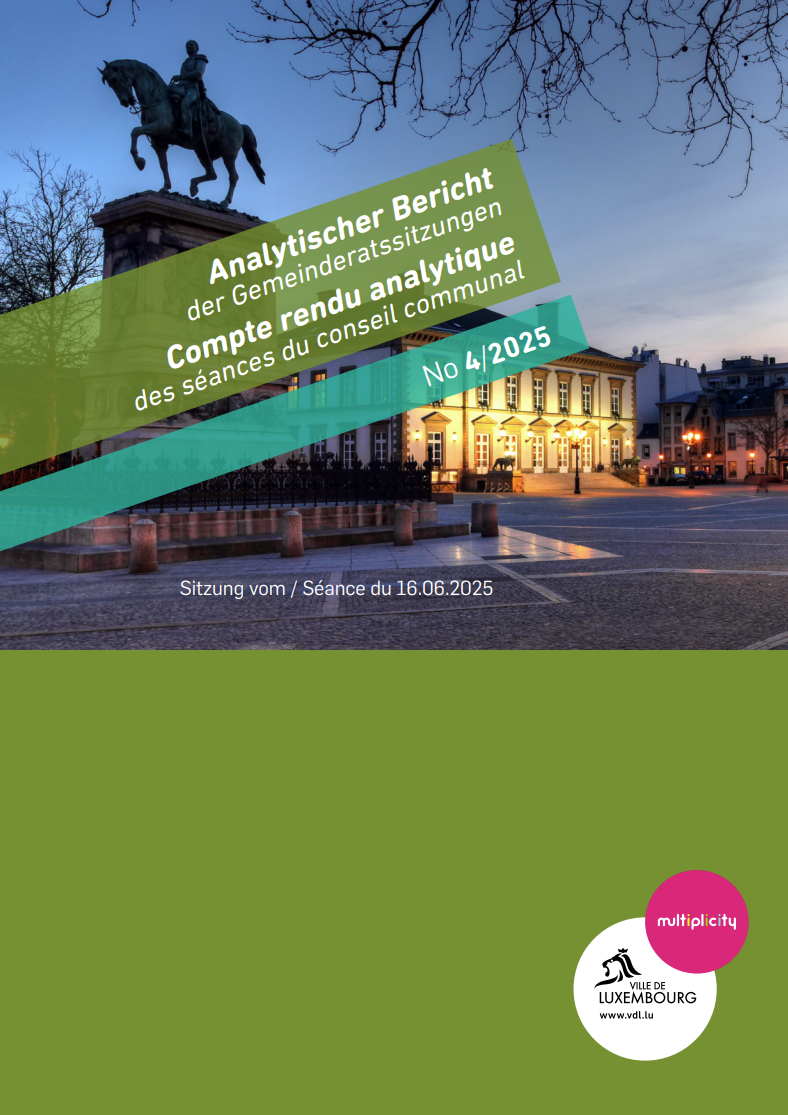
Keep reading

Questions asked by municipal councillors
Time slots and availability of sports facilities for swim clubs
Question posed by Claudie Reyland
Sports and physical exercise are essential, and are recommended for our physical and mental well-being. With the increase in the city's population, and the increasing popularity of sports and health clubs, the city's sports facilities have reached their saturation point. New facilities are not being built fast enough to meet demand. Which is why it is important to ensure that the limited capacity is managed wisely.
If we look at swimming, for instance, there are two clubs that are very active in Luxembourg City: Swimming Luxembourg and the Luxembourg Sharks. These two clubs, which have large membership bases, offer swimming classes and practise sessions (both amateur and competitive levels).
- Which municipal swimming pools – including school swimming pools – are currently available to these clubs? Which clubs are allowed to use municipal swimming pools?
- How often, and based on what criteria, are swimming pools and swimming-pool time slots allocated to these two clubs? Who establishes the criteria? On what basis – for example, number of members, or number of children or young people?
- What is the current pool and time-slot allocation status for the two semi-professional clubs, Swimming Luxembourg and the Luxembourg Sharks?
- Some swimming facilities are more in demand than others, because of factors such as how modern they are, where they are located or their accessibility. How does the City ensure that swimming clubs' requests are treated equally?
- Are there currently enough swimming pools and time slots to satisfy the demand?
- According to estimates by one of the clubs, reorganising how pools and time slots are allocated would increase capacity, in terms of the number of lanes and time slots available to clubs. Clubs would then be able to schedule more swimming lessons, for which there are long waiting lists. Has the City considered suggestions like these? If so, what conclusions has it reached?
- Given that there are not enough swimming lessons to meet demand, has the City asked the swim clubs to offer such lessons?
- Since Councillor Brömmel's question on the matter on 12 January 2024, what steps has the City taken to increase the number of swimming lessons available in Luxembourg City?
- What is the situation for other sports (athletics, football, basketball, etc.)? What can the City do to increase training-facility capacities for these clubs?
Response provided by Alderwoman Simone Beissel
Councillor François Benoy recently asked a question on a similar topic, but I will address it again so that everyone is on the same page.
Luxembourg City has experienced rapid growth, and our facilities are now being used at full capacity. Another factor contributing to the increase in demand is the fact that the city's international schools were built without sports. The timetables showing the time slots allocated to different associations and uses – from 6:00 through to 23:00 – have been shared with the municipal councillors.
We have seven swimming pools in the capital, including the "Badanstalt". Six of them can be used for all activities, i.e., swimming lessons, practise sessions and competitions. The new Luxembourg Sharks club was formed in 2018 by a break-away group of former members of Swimming Luxembourg, which was established in 1919. Swimming Luxembourg currently has 1,533 members, while Luxembourg Sharks has 731 members. Both clubs have waiting lists. When Luxembourg Sharks was created, the facilities had already reached saturation point, but we eventually managed to find time slots for them (specifically, in the Gare district), taking care to ensure that they would not be sharing the same facilities with Swimming Luxembourg at the same time.
There are also a number of other clubs and organisations in Luxembourg City that need to use our pools, including Sub Aqua Club, Triathlon Luxembourg Trilux, Canoë Kayak Luxembourg, LASEP and FLASSA (Fédération luxembourgeoise des activités et sports sub-aquatiques). In addition to that, there are the activities offered as part of our "Sports pour tous" (Sports for All) programme.
As part of the time-slot allocation process, the City's Service Sports (Sports Department) contacts the various clubs and associations every year to determine what their needs are. We also take into account the specific requirements of the different activities: for swimming lessons, for example, the pool must not be deeper than 1.2 metres, while other activities require a depth of between 2.0 and 3.8 metres.
As for facilities, we are doing our best. There are plans to build two additional 25-metre pools and another 50-metre pool. In Cents, the new pool was opened once the lifeguard understaffing issue had been resolved. In Cessange, there are plans for a large campus with a pool. In Dommeldange, the new school complex will also have a pool. We also have pools in Belair, Bonnevoie, Gasperich and Limpertsberg. However, this is still not enough.
Of course, the City applies the principle of equal treatment for all stakeholders. Our Service Sports allocates time slots without interfering in club's internal affairs, which means that clubs can decide for themselves how to use the time slots allocated to them. In cooperation with LASEP, we do whatever we can to offer swimming lessons for children.
I urge all clubs to avoid splitting up, since our facilities are so overbooked that the only additional time slots that would be available are at 4 o'clock in the morning.
AVL line 20 buses serving Parc Luxite in Kockelscheuer
Question posed by François Benoy
AVL line 20 buses have been operating between Luxembourg City and Parc Luxite in Kockelscheuer since winter 2022. They currently run between Luxembourg Central Station and Kockelscheuer on weekdays, with stops in Cloche d'Or and at Stade de Luxembourg, and with departures every 15 to 30 minutes. From what I have been told, keeping this bus line open is currently a topic of discussion, owing to a lack of funding.
- Can the College of Aldermen confirm this information?
- What are the specific reasons that justify reconsidering whether this line should be kept open, or changed?
- What is the annual operating cost of this line, and how is this cost currently being funded: by the City, other municipalities, national government, private sector?
- What have the ridership figures of the line 20 bus service been like since it started running? Has an analysis of the use of the line been conducted?
- Are alternatives being examined in case the service is discontinued or restricted? If so, what are they?
- Are discussions underway with external partners – such as Luxite, the national government or the municipality of Roeser – about their possible financial or logistical involvement, or about incorporating the line into the RGTR network?
- What is the College of Aldermen's current position on keeping this line as part of the AVL service offering?
- How will residents and users of this line be notified and involved?
Response provided by Alderman Patrick Goldschmidt
As far as the City knows, the future of this bus line is not in jeopardy. Changes were made to the line 20 service after the tram line to Gasperich was opened. The service was operated at a slightly higher frequency before.
This is neither an RGTR line, nor a coordinated line. When the City received the request to extend line 20, negotiations were held, which culminated in an agreement between the municipality of Roeser and the City of Luxembourg. Under this agreement, which was concluded in January 2023, the municipality of Roeser contributes to cost of operating the bus service on its territory. This contribution covers a daily distance of 177.966 km. The indexed price per kilometre is set at €6.30 excluding VAT. This cost is billed to the municipality of Roeser on a monthly basis by the City of Luxembourg. There are currently no plans for the national government to bear the costs. We do not know if the government grants a subsidy to the municipality of Roeser.
Since September 2022, the line 20 bus service has been used by more than two million passengers. We therefore have no desire to discontinue the service. If any changes to the service were to be made in the future, the two partners should get together to discuss the required changes.
We regularly analyse the entire bus network, to identify any potential changes we would need to anticipate, such as changes required to accommodate new needs.
Apéri'tours held in 2024
Question posed by François Benoy
Last year, the City organised Apéri'tours in the capital's various districts. During these walks, City officials and representatives of various municipal departments presented new projects that are already in progress, as well as those being planned for the future. They also took advantage of these tours to engage in dialogue with participants on topics such as opportunities to meet and interact with neighbours. According to City magazine, the ideas that were collected will now be presented at local district meetings.
- What exactly was the goal of the Apéri'tours? Does the College of Aldermen believe that they meet the criteria for achieving effective citizen participation?
- Who conceptualised these events, and were they professionally supervised? Did the City engage external experts in citizen participation?
- What was the total cost of the operation, including logistics, communication, catering and any other services?
- Was an interim report on the Apéri'tours drafted? If so, who drafted it – was it drafted internally or externally? When will this report be finalised and made public?
- To what extent will the comments, suggestions or criticisms voiced during the Apéri'tours be taken into consideration in municipal policies?
- What are the main conclusions that the College of Aldermen has drawn from this initiative?
- Generally speaking, what is the College of Aldermen's current strategy when it comes to citizen participation? What new forms of dialogue with residents are being considered?
Response provided by Mayor Lydie Polfer
As we stated in the College of Aldermen's mission statement, 2024 was the year of the city's 24 districts. The goal was to discuss the content of the College of Aldermen's mission statement with residents in a friendly setting. We received guidance from professional teams coordinated by the City's Service Urbanisme (Urban Planning Department). An architect from this department worked exclusively on this project for the whole year. The goal was also to listen to residents and hear what they thought about the development of their districts. Twenty-two events were organised in 2024. More than 1,800 people attended them. A document recapping the questions and answers was always published on the City's website the day after the meeting in the district in question.
On our website www.vdl.lu, we counted more than 48,000 visits to the pages on the 24 districts. These pages were entirely redesigned before the meetings in the districts began. They provide detailed descriptions of the 24 districts, including information about the number of inhabitants, businesses, sports facilities, schools and so on.
We believe that our initiative fully meets the criteria for citizen participation. The accessibility criterion was met: all 22 events were accessible to everyone. The "listening and speaking" criterion was also met, because we listened to what residents thought about their district. Inclusive methods were used: each Apéri'tour involved an hour-long walk through the district, followed by a gathering at a local venue to present our initiatives and give residents an opportunity to share their thoughts. There was a structured follow-up for each event. I will remind you that the analysis was published on our website the next day. The criterion of providing a welcoming setting was also met: after the more formal discussions, residents had the opportunity to continue the discussion over a glass of wine, water or orange juice.
The consultancy, Zeyen+Baumann, provided methodological and technical guidance for the Apéri'tours. This is the same firm that had been engaged to develop the 2017 general development plan (Plan d'aménagement général – PAG) and, as we all know, the PAG will need to be reviewed again in the coming years. Representatives from this consultancy attended all of the meetings, and recorded in broad outline hundreds, or even thousands, of suggestions. The City also worked with the University of Luxembourg on developing a methodology and running 22 participatory workshops, using the items identified during the walks, among other things, as a starting point. Online surveys were conducted in the districts in cooperation with the agency, Quest. The vast majority of residents are satisfied with the quality of life in their districts. The firm, YO studio, designed and executed the "Quartiermathon" initiative, an interactive booth where residents could share their visions of an ideal neighbourhood. The firm, STDM, ran drawing workshops in the districts and produced a series of sketches illustrating each district's unique characteristics and atmosphere. The "Mémoires sonores" (sound memories) project aimed to create an oral architecture of each district, shaped by the voices of its residents and the characteristic sounds of the locale. People will be able to listen to the recordings through an interactive digital map. An Ideation Lab was organised, in which residents spent two and a half days discussing a specific project. The agency, Verbalius, teamed up with DoYourThing to moderate and provide logistical support for the Ideation Lab, which the University of Luxembourg provided additional backing for.
According to budget estimates, the total cost of the operation – experts' fees, event fees, and documentation/publication fees – was €707,265 including VAT (€604,500 excluding VAT), of which €29,500 excl. VAT for Phase 1A (interactive maps, online survey and kick-off), €300,000 excl. VAT for Phase 1B (events in the districts: Apéri'tours and Ideation Lab), and €275,000 excl. VAT for Phases 2 and 3 (analysis, district meetings, development of an action plan, and documentation).
This was a very enlightening experience for us. As Councillor Benoy aptly pointed out, the Apéri'tours give district residents a chance to get to know their neighbours better. This is exactly what we all want: for our city to be as warm and welcoming as possible. In the coming months we plan to return to all of the districts where Apéri'tours were held. We will tell residents how we are able to implement their suggestions, and we will also discuss their desires and problems with them again.
Installation of underground containers for food waste
Question posed by Antónia Afonso Bagine
The City of Luxembourg has undertaken several notable waste recycling and recovery initiatives. In doing so, it is contributing to a more sustainable society. However, given the city's demographic growth, it seems that additional efforts are necessary. According to a recent study by the Environmental Management Agency (Administration de l'environnement), nearly 50% of household waste could be further recovered, particularly food waste (peelings, leftovers, etc.). Residents can request containers for organic waste from the municipality, but this is often impossible for households that live in apartment buildings, due to administrative requirements or because they need to avoid creating unpleasant odours.
Several European cities have set up underground containers for organic waste – this minimises irritants. In addition, access to waste sorting is facilitated for all residents. Does the City of Luxembourg plan to install underground containers for food waste, in order to promote their recovery?
Response provided by Alderman Patrick Goldschmidt
Every city resident can request a brown bin for organic waste. The College of Aldermen and the municipal departments believe that it is not a good idea to set up public containers for organice waste. This is for reasons of hygiene and public health: such containers can attract rats.
Where co-owned buildings are concerned, I will remind you that Article 13, paragraph 3 of the law of 21 March 2012 on waste management (loi du 21 mars 2012 relative à la gestion des déchets) states that "private or public establishments and residential buildings must have the necessary facilities to allow for the separate collection of the different fractions and qualities of waste that they have." As such, co-owned buildings must also have brown bins. If a resident wants to have a brown bin, but the co-owners' association does not, the resident can request guidance from the City's Service Hygiène (Sanitation Department).
As for bothersome odours, I will remind you that, for a fee, residents can have a Service Hygiène team clean the bins after they are emptied. This service can be very useful, especially in the summer.
Implementation of a heat wave plan for homeless people
Question posed by Marie-Marthe Muller
In Luxembourg, the heat wave plan focuses mainly on protecting elderly and vulnerable people – which is completely appropriate and necessary – and provides for specific procedures, such as wellness checks and hydration assistance for people over 75 who live alone. On its website, the City of Luxembourg states that people must register with the Red Cross.
However, there are no specific municipal initiatives geared towards homeless people during heat waves. Support for this population relies mainly on actions undertaken by NGOs, which receive substantial backing from the City. However, according to players on the ground, no heat wave plan has been put in place as yet, even though temperatures have already reached high levels. Homeless people are exposed to severe weather conditions all year round, not just in the winter.
- Are there plans to distribute bottles of water?
- Are there plans to create areas that are protected from the sun (climate shelters), for instance by installing sun shades in places where homeless people gather – for example, in Place du Théâtre? Other European cities, such as Barcelona and Münster, already have such shady spaces for homeless people.
- How many drinking fountains, like the one in Place Guillaume II, are there in Luxembourg City?
- How many public showers are currently open to homeless people? Access to showers could also help prevent the risks associated with sun exposure.
- Does the City plan to deploy mobile showers that can be moved to different districts to help homeless people better tolerate the heat waves forecast for the coming weeks?
Response provided by Alderwoman Corinne Cahen
You are quite right: homeless people face not only the problem of cold in the winter, but also heat in the summer. The heat wave plan, which has existed since 2003, applies to elderly people, as well as homeless people.
During heat waves, our street-work teams distribute additional bottles of water (which they always have on them) to homeless people, and talk to them about the importance of staying adequately hydrated. The street-work teams are well positioned to accomplish this task, because they are in direct contact with homeless people and know where they often congregate.
There are no plans to install sun shades, but there are many shady spots in the city, such as in the parks. There are also many facilities that homeless people can visit, such as the bistrot social and Para-Chute. In the summer, there are some 50 water fountains scattered around the city that are accessible to everyone. There are several places where homeless people can shower, including at the "Badanstalt" (with a Red Cross voucher), the bistrot social, "Stëmm vun der Strooss", "Halte 28", and Abrigado. Installing more showers in the capital would be a sensible move, because feeling clean is important for self-esteem. That is why we are continuing to look for suitable locations. We do not want to create mobile showers, but rather stationary showers that can be used all year round.
Follow-up to the ruling handed down by an appeals court in favour of the non-profit organisation, ZUG
Urgent question posed by François Benoy
Following the ruling handed down on 3 June 2025 by the Administrative Court, which again ruled in favour of the non-profit, ZUG, in its request to access documents on the safety of pedestrian crossings in Luxembourg City, I would like to put several urgent questions to the College of Aldermen. I want to stress that the Administrative Court specifies in its ruling that it "does not see how sharing these documents would involve sensitive data, or would run counter to public order or personal safety."
This is a victory for civil society and citizens, in that it paves the way for more transparency. I will remind you that ZUG partly funded its lawsuit through crowdfunding. The lawsuit was brought against the City of Luxembourg – in which the majority is held by the DP-CSV coalition – which refused to simply provide ZUG with the requested information and opted to let the non-profit grapple with the various judicial authorities. It was a little like David fighting Goliath. In this case David won. In terms of transparency, this is clearly an unsatisfactory outcome for the political majority. We hope the City will learn the necessary lessons and, in the future, will demonstrate the required transparency in its relations with associations, in accordance with the legislation and as the justice system has just confirmed.
- When and how does the City plan to provide ZUG with the requested documents, and to organise the viewing of its database?
- How will public access be organised?
- What were the attorneys' fees incurred by the City as part of these proceedings, broken down by judicial body? This ruling marks an important step for the right to information and administrative transparency.
- When and in what form does the City intend to publish the documents subject to the obligation of automatic publication, as stipulated in Article 2 of the amended law of 14 September 2018 on a transparent and open administration (la loi modifiée du 14 septembre 2018 relative à une administration transparente et ouverte)?
- What other concrete steps does the City plan to take to improve transparency towards citizens in the long term?
Response provided by Mayor Lydie Polfer
Councillor Benoy's presentation bears little resemblance to reality. Let's stick to the facts. This is about two things. To be sure, this was a matter of principle for us, but it was just as much a matter of principle for ZUG.
On the one hand, the issue had to do with what is meant by the term, "internal document". In point of fact, the City acted in accordance with a ministerial circular sent out under former Minister of the Interior, Taina Bofferding. The amended law of 14 September 2018 on a transparent and open administration states clearly that the College of Aldermen can refuse to disclose internal documents presented during a closed meeting. College of Aldermen meetings are not open to the public. Based on the ministerial circular in question, our interpretation was that internal documents presented in closed session are not public either. On this issue, ZUG was indeed successful – in this particular case! The court found that the documents in question were no longer internal, because they had been discussed in a public Municipal Council meeting. This is duly noted. The day after the ruling was handed down, we immediately sent ZUG and its lawyer the three-page note forwarded to the College of Aldermen by the City department in question. We also sent them the document entitled "analysis".
Now let's turn to the second point, i.e., ZUG's request to access the City's electronic database. They even demanded that the information it was interested in be provided on a USB drive. The College of Aldermen met with ZUG's representatives in April 2022. We suggested showing them, at the offices of the relevant department, the records in the City's database concerning the pedestrian crossings in question. We confirmed this offer to them in writing. But this was not enough for them, because they wanted to obtain a decision in principle on this point. And on this point, ZUG did not win its case. The court granted it exactly what we had offered it three years ago, and nothing more. We wrote to them immediately after the ruling was handed down. They can therefore now make an appointment to view the database records concerning the pedestrian crossings. To date, ZUG has not yet requested a meeting.
We had nothing to hide three years ago, and we still have nothing to hide today. If there is such a thing as a transparent administration, it is definitely us. As far as I know, we have never refused to share with a municipal councillor a document they have requested. But we must also abide by the laws and safeguard our citizens' security. The database that we are talking about contains a lot of sensitive data – such as data on the electricity grid and the gas grid – and it is important that such data not be disclosed to the public. We have always ensured that sensitive data is processed confidentially, and we will continue to do so.
As for the cost of the legal proceedings, the response is: not a cent. All of the fees are covered by our legal expenses insurance.
François Benoy: At some point I will find out how much the legal expenses insurance costs, because it surely isn't free.
I disagree completely with your analysis of the situation, Madam Mayor. You offered an exchange of views, but you did not give ZUG access to the database.
Mayor Lydie Polfer: I most certainly did!
François Benoy: The offer the City made to ZUG was not the one that appears in the court ruling: ZUG must have access to the database for an entire day.
You did not answer my questions about how you plan to proceed if another citizen wants to access the database, nor did you answer my questions on the changes the College of Aldermen plans to introduce to improve transparency towards citizens and civil society.
Mayor Lydie Polfer: Mr Benoy, you are mistaken. In our letter, we offered ZUG exactly what the Administrative Court just granted it. The court simply specified that ZUG had to be given access to the database for eight hours. Access is therefore time limited. Moreover, a member of the municipal administration must be present. We are dealing with basic security issues here.
If another citizen requests access to the database, we will need to check exactly what information they want to obtain, and whether there is a legitimate interest for obtaining it. If, for example, an individual with no legitimate interest (for example if they are not an owner or resident) requests the plans of a building, whether it is a residential building or a bank, they will not get this information from us. If the individual has a legitimate interest and the City is allowed to provide the desired information, the individual in question will be given access to the database. ZUG had requested unlimited access to the database, and that they be provided with all of the information on a USB drive. The court rejected these requests.
Article 13, paragraph 3 of the Municipal Law establishes that each member of the Municipal Council, acting in their individual capacity, shall enjoy the right of initiative to add to the agenda drawn up by the College of Aldermen one or more proposals that they wish to submit to the Municipal Council.
Such proposals must be submitted to the mayor in the form of a written reasoned request at least three days before the meeting of the Municipal Council.
